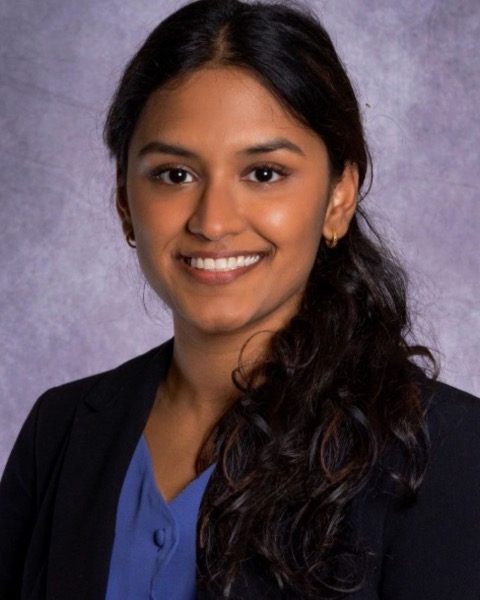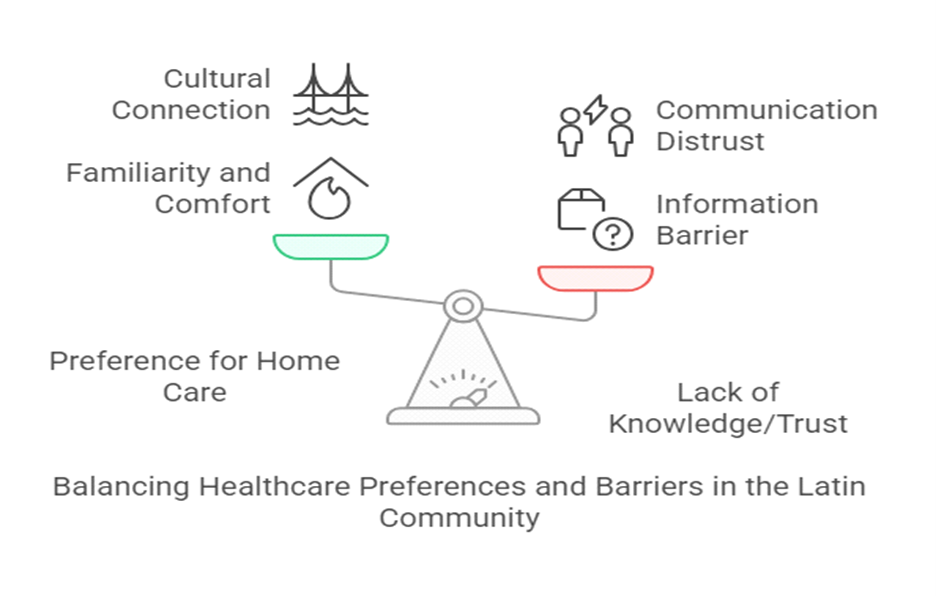Monday Poster Session
Category: Colorectal Cancer Prevention
P2651 - Identifying Barriers and Recommendations for Colon Cancer Screening in an Immigrant Community: Lessons From Focus Groups
Monday, October 27, 2025
10:30 AM - 4:00 PM PDT
Location: Exhibit Hall

Mrudula Bandaru, MD (she/her/hers)
Department of Medicine, George Washington University School of Medicine and Health Sciences
Washington, DC
Presenting Author(s)
Ivan Berezowski, MD1, Katherine Rangoussis, BS, MS2, Mrudula Bandaru, MD3, Zeina Bani Hani, MBBS4, Valerie S. Stark, MD, MPH3, Benjamin Pfaff, BS2, Lucas Miecho. Heilbroner, BA2, Liza Khutsishvili, BS5, Marie L. Borum, MD, EdD, MPH, FACG6
1George Washington University Hospital, Vienna, VA; 2George Washington University School of Medicine and Health Sciences, Washington, DC; 3Department of Medicine, George Washington University School of Medicine and Health Sciences, Washington, DC; 4George Washington University, Washington, DC; 5George Washington School of Medicine and Health Sciences, Arlington, VA; 6Division of Gastroenterology and Liver Disease, Department of Medicine, George Washington University School of Medicine and Health Sciences, Washington, DC
Introduction: Immigrants in the United States undergo colorectal cancer (CRC) screening at significant lower rates than those born in the US. Hispanic adults have reported screening rates of 52%, with adults speaking only Spanish having rates as low as 32%. Multiple factors have been reported to contribute to suboptimal screening. However, it is important to understand community-specific issues. This study evaluated findings of a focus group addressing CRC screening in a predominantly Hispanic immigrant community.
Methods: University health care providers and administrators at an urban community center available for Spanish-speaking immigrants collaboratively planned a health fair to improve CRC awareness. Two focus groups were conducted to identify barriers and obtain community recommendations for CRC screening. The focus groups were led by a Spanish-speaking facilitator. Discussions were recorded with verbatim transcription. Thematic analysis was conducted through an iterative process by 2 investigators. Qualitative and quantitative assessment was conducted. Quantitative analysis was performed using a t-test with significance set at p< 0.05.
Results: Two focus groups had 10 self-identified Hispanic participants (first with 5 males, 2 females; second with 1 male, 2 females). Primary barriers impacting CRC screening included lack of knowledge about CRC (70%), fear of procedures or diagnosis (70%), job security concerns (50%), access to care and cost (40%), preference for seeking care for illness rather than prevention with tendency for home remedies (30%). There was no significant difference between genders regarding knowledge (p=1.000), fear (p=0.50), job security (p=0.50), access to care (p=0.40) and preference for illness seeking care (p=0.50). Recommendations to increase CRC screening included increased community outreach (50%), enhanced provider trust (30%), improvement in educational material (30%) and use of social media (40%). There was no significant difference between genders recommending outreach (p=1.00), enhanced provider trust (p=0.47), improvement in educational material (p=0.47) and use of social media (p=0.57).
Discussion: This study offers insight into a Hispanic immigrant community’s perspectives about CRC screening. Tendency for illness-seeking care and reliance on natural remedies are issues that may be under-recognized. It is important to identify community-specific concerns when developing programs to improve CRC screening.

Figure: Figure 1: Common themes in barriers for colorectal cancer screening in the Latin community focus group.
Disclosures:
Ivan Berezowski indicated no relevant financial relationships.
Katherine Rangoussis indicated no relevant financial relationships.
Mrudula Bandaru indicated no relevant financial relationships.
Zeina Bani Hani indicated no relevant financial relationships.
Valerie Stark indicated no relevant financial relationships.
Benjamin Pfaff indicated no relevant financial relationships.
Lucas Heilbroner indicated no relevant financial relationships.
Liza Khutsishvili indicated no relevant financial relationships.
Marie Borum indicated no relevant financial relationships.
Ivan Berezowski, MD1, Katherine Rangoussis, BS, MS2, Mrudula Bandaru, MD3, Zeina Bani Hani, MBBS4, Valerie S. Stark, MD, MPH3, Benjamin Pfaff, BS2, Lucas Miecho. Heilbroner, BA2, Liza Khutsishvili, BS5, Marie L. Borum, MD, EdD, MPH, FACG6. P2651 - Identifying Barriers and Recommendations for Colon Cancer Screening in an Immigrant Community: Lessons From Focus Groups, ACG 2025 Annual Scientific Meeting Abstracts. Phoenix, AZ: American College of Gastroenterology.
1George Washington University Hospital, Vienna, VA; 2George Washington University School of Medicine and Health Sciences, Washington, DC; 3Department of Medicine, George Washington University School of Medicine and Health Sciences, Washington, DC; 4George Washington University, Washington, DC; 5George Washington School of Medicine and Health Sciences, Arlington, VA; 6Division of Gastroenterology and Liver Disease, Department of Medicine, George Washington University School of Medicine and Health Sciences, Washington, DC
Introduction: Immigrants in the United States undergo colorectal cancer (CRC) screening at significant lower rates than those born in the US. Hispanic adults have reported screening rates of 52%, with adults speaking only Spanish having rates as low as 32%. Multiple factors have been reported to contribute to suboptimal screening. However, it is important to understand community-specific issues. This study evaluated findings of a focus group addressing CRC screening in a predominantly Hispanic immigrant community.
Methods: University health care providers and administrators at an urban community center available for Spanish-speaking immigrants collaboratively planned a health fair to improve CRC awareness. Two focus groups were conducted to identify barriers and obtain community recommendations for CRC screening. The focus groups were led by a Spanish-speaking facilitator. Discussions were recorded with verbatim transcription. Thematic analysis was conducted through an iterative process by 2 investigators. Qualitative and quantitative assessment was conducted. Quantitative analysis was performed using a t-test with significance set at p< 0.05.
Results: Two focus groups had 10 self-identified Hispanic participants (first with 5 males, 2 females; second with 1 male, 2 females). Primary barriers impacting CRC screening included lack of knowledge about CRC (70%), fear of procedures or diagnosis (70%), job security concerns (50%), access to care and cost (40%), preference for seeking care for illness rather than prevention with tendency for home remedies (30%). There was no significant difference between genders regarding knowledge (p=1.000), fear (p=0.50), job security (p=0.50), access to care (p=0.40) and preference for illness seeking care (p=0.50). Recommendations to increase CRC screening included increased community outreach (50%), enhanced provider trust (30%), improvement in educational material (30%) and use of social media (40%). There was no significant difference between genders recommending outreach (p=1.00), enhanced provider trust (p=0.47), improvement in educational material (p=0.47) and use of social media (p=0.57).
Discussion: This study offers insight into a Hispanic immigrant community’s perspectives about CRC screening. Tendency for illness-seeking care and reliance on natural remedies are issues that may be under-recognized. It is important to identify community-specific concerns when developing programs to improve CRC screening.

Figure: Figure 1: Common themes in barriers for colorectal cancer screening in the Latin community focus group.
Disclosures:
Ivan Berezowski indicated no relevant financial relationships.
Katherine Rangoussis indicated no relevant financial relationships.
Mrudula Bandaru indicated no relevant financial relationships.
Zeina Bani Hani indicated no relevant financial relationships.
Valerie Stark indicated no relevant financial relationships.
Benjamin Pfaff indicated no relevant financial relationships.
Lucas Heilbroner indicated no relevant financial relationships.
Liza Khutsishvili indicated no relevant financial relationships.
Marie Borum indicated no relevant financial relationships.
Ivan Berezowski, MD1, Katherine Rangoussis, BS, MS2, Mrudula Bandaru, MD3, Zeina Bani Hani, MBBS4, Valerie S. Stark, MD, MPH3, Benjamin Pfaff, BS2, Lucas Miecho. Heilbroner, BA2, Liza Khutsishvili, BS5, Marie L. Borum, MD, EdD, MPH, FACG6. P2651 - Identifying Barriers and Recommendations for Colon Cancer Screening in an Immigrant Community: Lessons From Focus Groups, ACG 2025 Annual Scientific Meeting Abstracts. Phoenix, AZ: American College of Gastroenterology.
